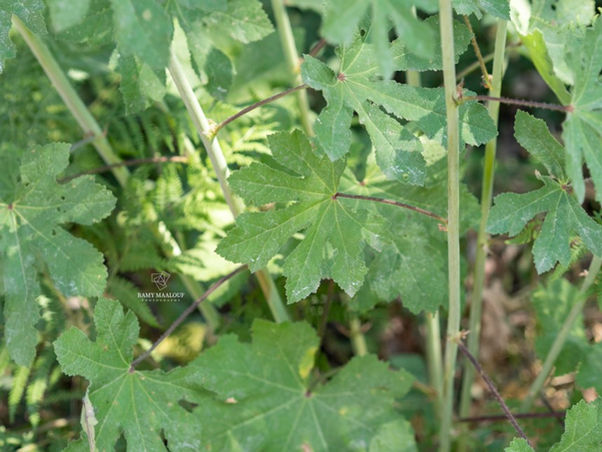Family |
Malvaceae
Alcea setosa
(Boiss.) Alef.
Alcea setosa (Boiss.) Alef.
(Nouvelle Flore du Liban et de la Syrie, vol. 2, p. 509, Pl. CCXIX nº 2; 1966)
Life‑form & habit : Robust biennial to short‑lived perennial, 1 – 2 m tall; stems stout, erect, usually little‑branched, densely clothed in long, spreading, bristly hairs that give the whole plant a harsh texture.
Leaves : Large, long‑petiolate and palmately 5 – 7‑lobed almost to mid‑blade; lobes broadly triangular with coarsely crenate margins. Both faces bear stiff, whitish setae that are longest on the nerves and margins; upper leaves gradually smaller and shortly petiolate.
Inflorescence : A tall, rather lax terminal raceme; flowers solitary in the axils of reduced leafy bracts, each on a very short pedicel.
Calicule & calyx : Epicalyx of 6 – 8 narrow, lanceolate, bristly segments reaching about half the length of the 5‑lobed calyx; calyx tube and lobes densely hispid.
Corolla : Petals broad‑obovate, 4 – 6 cm long, vivid rose‑pink to purplish‑red; claws ciliate; limb shallowly notched.
Fruit : Carpels densely setose, dorsally shallow‑grooved; seeds brown‑black, minutely tuberculate.
Flowering period : April – August, sometimes later at higher elevations.
Habitat & ecology : Roadsides, field margins, fallow ground and rocky slopes on limestone or basaltic soils; favours sunny, moderately dry sites from near sea‑level to c. 1 200 m.
Native range : Eastern Mediterranean endemic—common in Lebanon from the coastal plain (Beirut, Byblos, Saïda) through foothills to the Beqaa and lower slopes of Mount Lebanon; frequent in western and central Syria, Palestine, Israel and southern Turkey.






